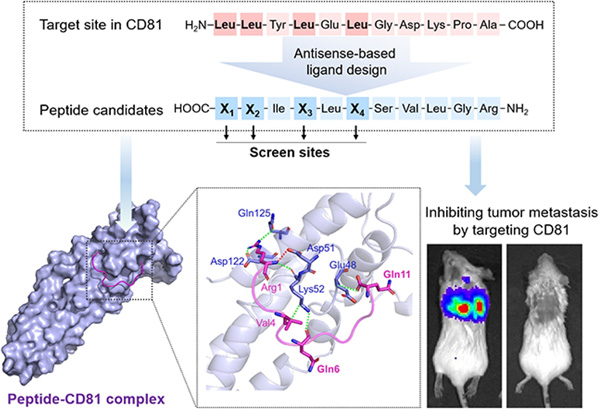Researchers Develop a Synthetic Peptide Inhibits Cancer Metastasis by Modulating Cell-Cell Communication
Recognition and manipulation of protein interactions at cell-contact interfaces are pivotal for understanding and interfering with intercellular crosstalk and regulating physiological processes.
In a study published in Angewandte Chemie International Edition, the research group led by Prof. ZHAO Rui from the Institute of Chemistry of the Chinese Academy of Sciences (ICCAS) designed and identified a peptide with strong binding to the small extracellular loop (SEL) of tetraspanin CD81 to probe its biological functions which are largely unclear.
They designed a small pool of peptide candidates with tailorable affinity based on the genetic codons of the target protein. The optimal peptide, that spontaneously forms a tight complex with CD81, can be identified by a mix-and-read screening platform featuring in fast and single-residue resolution.
Using the peptide as the affinity ligand, they revealed the differences in membranal distribution of CD81 between an individual breast cancer cell and cell-contact interfaces. The SEL-targeted binding of the peptide triggers the protein relocation and aggregation on the cell tight junctions, suggesting the role of SEL in mediating cell-cell interactions which was rarely studied before.
Motivated by the potentials of the peptide in functional regulation of CD81, the researchers further used the peptide for the inhibition of cell migration and movement in a CD81-dependent manner. Further, the peptide was used for in vivo anti-tumor growth and metastasis inhibition. Effective inhibition of lung metastasis in highly aggressive triple-negative breast cancer was achieved in mice model.
This study highlights SEL in CD81 as a new target and the peptide as an effective chemical tool for precise diagnosis and treatment of malignant tumors.

Tailoring synthetic peptides for site-specific binding of CD81 and metastasis inhibition (Image by HUANG Yanyan)
Contact:
Prof. ZHAO Rui and Prof. HUANG Yanyan
Institute of Chemistry, Chinese Academy of Sciences
Email: zhaorui@iccas.ac.cn, yyhuang@iccas.ac.cn





